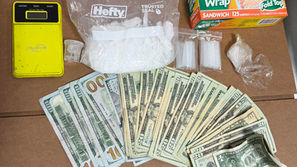Remembering Judge Crocker
- Nov 3, 2021
- 4 min read

Courtesy of the Madera County Historical Society
Madera County Superior Court Judge, M.D. Crocker. Judge Crocker was the county’s 3rd superior court judge. Not long after his installation on the superior court, Judge Crocker was elevated to the federal bench in Fresno.
The year was 1958, and President Dwight David Eisenhower was looking for a few good judges. Since one of the federal vacancies he was attempting to fill was in California’s San Joaquin Valley, he wound up appointing Madera County Superior Court Judge, M.D. Crocker. It was an excellent choice, but one that might never have been made possible had it not been for the ambition of a couple of judges from a neighboring county.
The process for nominating federal judges begins in the offices of the United States Senators from the state in which the vacancy exists. In this particular case, William F. Knowland had the responsibility of advising the President on his choice. As fate would have it, Knowland knew exactly what he was looking for; he just didn’t know for whom, until the Madera County Bar Association made its move.
The word had been out for some time that a federal judgeship had opened up in the Valley, and a flurry of activity accompanied that revelation. The leading contenders were two well-seasoned superior court judges from Merced County.
Initially, Madera County’s young Judge, M.D. Crocker, never considered himself to be in the running. After all, he was just 42 and had only been on the superior court bench a short time. He reckoned, however, without the machinations of the two aspirants from Merced.
Since the Madera County Bar Association would be among those groups submitting recommendations to Knowland, the Merced judges attempted to exert a little behind-the-scenes pressure, each in their own favor of course. One of the men who frequently held court in Madera County was particularly insistent, suggesting in strong terms over after-hours cocktails that it would definitely be disadvantageous for the Madera County Bar to endorse his fellow Merced County jurist.
Faced with what some would have interpreted as an ultimatum, the Madera attorneys sought to diffuse the situation by endorsing neither of the Merced judges. Instead they turned to Judge Crocker. When the young judge consented to having his hat “thrown into the ring,” he thought little more about it, until he received a call from Senator Knowland.
In a meeting with the Senator, Crocker was told that he met two of Knowland’s criteria. He was young, which meant that he would have to earn his retirement, and he was a Republican. The Senator informed the Madera County Judge that he was going to submit his name to the President, and on December 26, 1958, Knowland made his decision public.
Judge Crocker now realized that he could very well be leaving the Madera County’s Superior Court for the federal bench. It was an inspiring thought, but the Judge wasn’t holding his breath. Knowland’s recommendation still had to be accepted by the President after which Crocker would have to be confirmed by the Senate. He still had a long way to go.
From December 26, 1958, until February 15, 1959, Crocker heard not a word. Then on February 16, a newspaper reporter called to get his reaction to the news that the President had submitted his name to the Senate for confirmation. This was the first that the Judge had heard of his official nomination by the President.
Immediately the jockeying to fill Crocker’s shoes began. There was never any doubt among the home folks that the local judge would be elevated to the federal bench. After graduating from law school at the University of California, Berkeley, he had been a FBI agent. From there he came to Madera as an Assistant District Attorney. Following his tenure as Judge of the Chowchilla Justice Court, Crocker had been appointed to succeed Judge Stanley Murray as Madera County’s third Superior Court Judge. Clearly, Madera County’s choice for the federal post stood on an impeccable record.
Still, Judge Crocker realized that politics was an inexact science, and there were a few more hills to climb. He still had to get past the Senate Judiciary Committee, and judicial appointments were having a hard time in Washington, especially those from the districts of the South.
For the next few months, the silence was deafening. Weeks melted into months, and still no word. Then on June 10, 1959, a summons came. Crocker was ordered to report to meet with the Judiciary Committee in the nation’s capital. The local jurist left the committee feeling confident for perhaps the first time. There appeared to be no opposition, and his hearing didn’t take long. He even found time for a brief visit with Chief Justice Earl Warren. Upon leaving Washington, Judge Crocker expected that his confirmation by the full Senate was just a short time away. But he had one final hurdle to clear.
Judge Crocker’s nomination lay in committee with 40 or 50 other Eisenhower appointments until near the end of the session. With each day that passed, Crocker’s optimism lessened. Then on the eve of adjournment, the nominations were finally reported out, and the President’s selection of M.D. Crocker was confirmed. Madera County now could boast that the third Superior Court Judge in its history had become a federal judge. Local folks were grateful to those Merced judges who tried to flex their muscles in Madera and wound up sealing their own fate.
Judge M.D. Crocker died on February 2, 2010. A memorial service was conducted for him in Chowchilla on February 20, 2010. This writer joins all who knew Judge Crocker in expressing respect for his lifetime of service.


























Comments